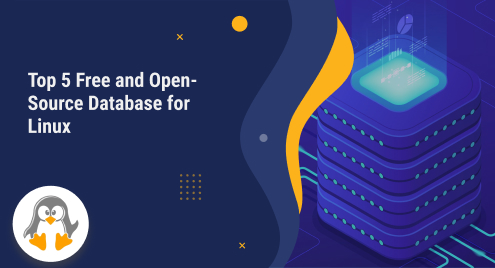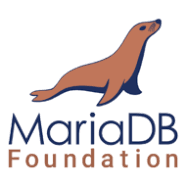
Top 5 Free and Open-Source Database for Linux
Since its inception in the year 1960, databases have evolved dramatically. Systems store data electronically in an organized and structural form which is controlled under a database management system. A database system or database is the collection of this stored data, DBMS, and the associated applications. This data is utilized to gather information regarding people, places, and things. Information that is further used to obtain knowledge on these matters. This obtained knowledge is then implemented to take relevant actions and make a difference. The database helps you in accessing data easily with complete data independence. It also majorly reduces the application development time. Provides you with data integrity and privacy. They ease the process of uniform data administration. Another major benefit is the instant recovery from the crashes and concurrent access to the data. Databases are of great use when incorporated into the business. The possibility of storing any kind of virtual information is ensured by the usage of databases in the corporate system. With the click of a mouse that stored information is sorted and delivered to you. They ensure the productivity and sustainability of the business by helping you keep track of transactions, and providing detailed information that can help businesses take favorable steps to grow. Managers are guided to make better decisions regarding teams and teams are instructed on how to implement those decisions to ensure the maximum productivity of business. It helps in managing the lifeblood of the business whether they are working at a small or large scale.
Previously, organizations like IBM, Microsoft, and Oracle were utilizing their proprietary tools and managing the databases, but now, open-source and free databases have gained popularity among newcomers in the market. We have penned down the list of 5 top free and open-source databases that can aid you in managing your business successfully.
MySQL

For ages, MySQL has been the most popular choice for developers which is why if you would dig deeper, you would find MySQL on the top of the most lists. The rational database management system is developed and managed by Oracle which allows storing data in the tubular form linking different stored data types. A staple of app development that provides an edge to MySQL over others is the provision of compatibility and open-source code that allows developers to transition it accordingly without wasting time on relearning MySQL. Many other databases mimic the functionality and tools of MySQL. You can connect to the database using any programming language but to work with it relationally you would use SQL. Although, the learning curve for SQL is not steep and it is not required for you to learn much about SQL. This database is the one solution for all in most cases as it is solid, dependable, and quick but except for a few limitations such as it is not as quick for larger databases sizes as it is for smaller ones. There are occasions of data corruption that lag down the popularity, also the need for improvement in the case of debugging tools is a lot. Overall there are not many flaws to describe, which makes it the user’s favorite choice.
Get it now from https://www.mysql.com/downloads/
MariaDB

This free and open-source database is the fork of MySQL which was developed after the acquisition of MySQL by Oracle. Even after removing plenty of essential components, MariaDB remains as compatible as possible with MySQL. It uses the Aria as its storage engine which enables users to carry out both transactional and nontransactional activities. It ensures excellent speed enabled through the thread pool and query result caching. To achieve high availability, it provides replication, automatic failover, and clustering. Also, user privacy is ensured with the encrypted connection, dynamic data masking, encrypted logs, and buffers. MariaDB is an excellent choice to deploy for mission-critical applications. A few other worth mentioning features are backup support, non-blocking backup, IDERA SQL diagnostics, and SQLYOG.
Get it now from https://mariadb.com/downloads/
MongoDB

MongoDB is a popular free and open-source NoSQL database that is based on C++ language. It exhibits a dynamic schema and being a document-oriented database, it stores data in JSON-like documents. It frees you from worrying about the number of fields, data structure, and type of fields while you are saving your data. You can easily compare the Mongo documents to the JSON documents since the former is mirroring the latter. A worth-mentioning feature of this database is the easy structure change of the record which facilitates the hierarchical relationships, delicate data structures, and store arrays. You can easily store documents of any type, size, content, and field in one single collection of the database via a schema-less database with great flexibility. MongoDB makes data retrieval from the pool quite easy because it incorporates indexed documents using primary and secondary indices. It aids in accessing data even if it is corrupted or a server fails to retrieve it, by replicating and spreading data over numerous servers. This data sharing over many servers is done by sharding which allows horizontal scalability. MongoDB has spread its wings to the major titans of the industry like Google, Facebook, eBay, and Adobe, and is providing storage services to them.
Get it now from https://www.mongodb.com/try/download/community
Redis

Redis exhibits distinct features from other listed databases which helps it gain the user’s attention. It enables you to structure the data as key-value pairs. This is similar to the dictionaries in Python or arrays in PHP. This helps you to link data that can be assessed later with great speed. When speed is in question then Redis is the got to the database for caching because it is entirely incorporated into RAM. You can save time by only learning about the basics of Redis in minutes and can start storing data in it. Another major benefit is that you will be able to set expiry times to strings which is an important component for caching. These features make it a perfect solution for data distribution and caching. you will require other databases along with Redis to fully support the complex applications because it alone can not handle the complexity of a few applications.
Get it now from https://redis.io/download/
PostgreSQL
![The World's Most Advanced Open Source Relational Database[1]](https://linuxgenie.net/wp-content/uploads/2023/06/the-worlds-most-advanced-open-source-relational-d.png)
This free, open-source, and object-relational system database is around for almost 3 decades. Its dependability, robust features, superiority, and fast response have made it the go-to option for developers. It has high compatibility with SQL and incorporates plenty of workloads. It also shows high compatibility with many third-party and proprietary tools and a wide range of different programming languages. A little need of improvement is still required for the Full vacuum Schema and JSON-type documents. Some notable features are asynchronous replication, full-text searches, geolocation, ranges, and arrays, native support for XML, and key-value storage.
Get it now from https://www.postgresql.org/download/
Closing Remarks
Businesses have access to unlimited data nowadays, that is capable of transforming lives and changing dynamics. Forward-thinking organizations have utilized this massive data collection to analyze, assess and act via databases that go beyond basic data storage. They have ensured efficiency, better decision-making, agility, and scalability by incorporating these business intelligence tools and by leveraging the collected data but high optimization is required to track this massive amount of data. This calls for a platform that can ensure high performance, scalability, and agility as the business needs are changed with the growth. To help you with our search for the perfect database, we have listed 5 top free and open-source databases that are capable of fulfilling your business requirements as it grows over time.

